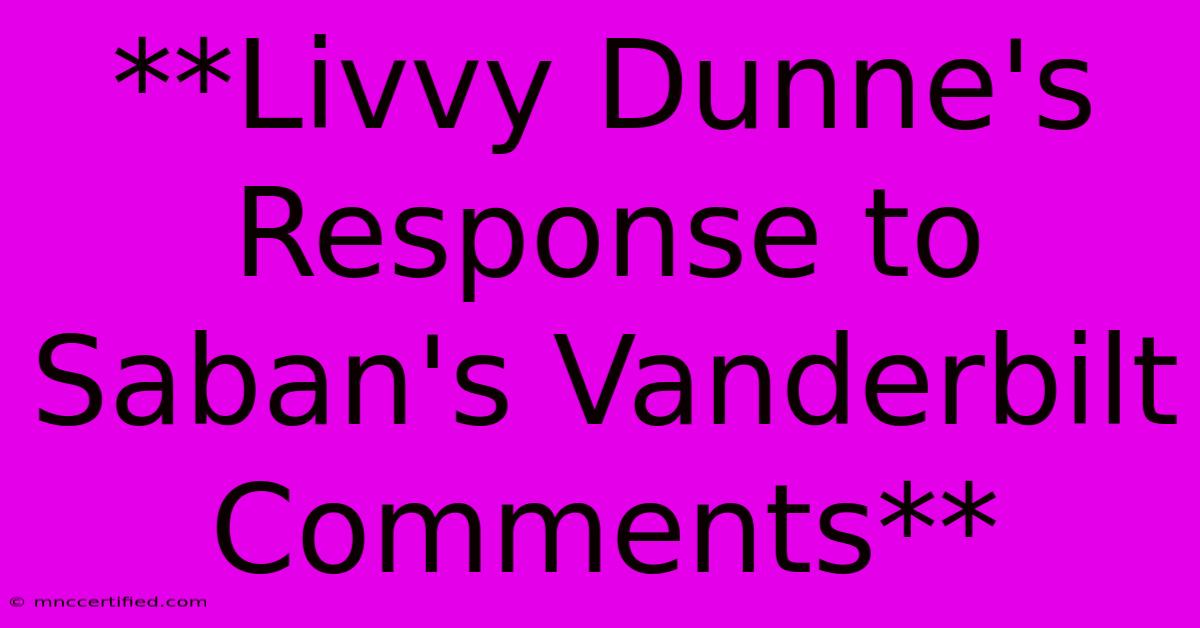**Livvy Dunne's Response To Saban's Vanderbilt Comments**

Table of Contents
Livvy Dunne's Response to Saban's Vanderbilt Comments: A Look at the Controversy
The world of college sports is a whirlwind of passion, pressure, and occasionally, controversy. Recently, a viral video featuring Alabama football coach Nick Saban criticizing Vanderbilt's recruiting tactics sparked a wave of reactions, including a powerful statement from LSU gymnast and social media influencer, Livvy Dunne.
Saban's Comments and the Context
During a press conference, Saban pointed a finger at Vanderbilt, alleging their use of "Name, Image, and Likeness (NIL)" deals to lure potential recruits. He claimed they were offering athletes "things that aren't legitimate" and using NIL as a "competitive advantage."
This ignited a firestorm of debate, particularly within the college sports world. The comments were seen by many as an attack on a program like Vanderbilt, which, unlike powerhouse Alabama, doesn't have the same resources and financial backing. The conversation quickly shifted to the broader landscape of NIL in college sports, a relatively new terrain that is still being navigated.
Livvy Dunne's Powerful Response
Dunne, a prominent athlete and social media figure, entered the fray with a response that resonated widely. In a video posted on her Instagram story, she expressed her disagreement with Saban's stance, stating that NIL deals are a "legitimate business" and an opportunity for student-athletes to capitalize on their hard work. She further highlighted the significance of NIL for women's athletes, stating that it could help bridge the financial gap often experienced in women's sports.
Dunne's response gained traction, attracting attention from both sports fans and the broader online community. Her words, delivered with passion and conviction, struck a chord with many who viewed Saban's comments as a dismissive view of NIL's potential.
Examining the Controversy
The controversy surrounding Saban's comments and Dunne's response brings to light several important points:
- The evolving nature of NIL in college sports: While NIL has opened new avenues for athletes, there are still ongoing discussions about its implementation and ethical considerations.
- The financial disparity between programs: The financial imbalance between programs like Alabama and Vanderbilt is a long-standing issue that NIL has amplified.
- The importance of supporting women's sports: Dunne's voice shines a light on the need for equitable opportunities for female athletes, particularly in areas like NIL deals.
The debate over Saban's comments and Dunne's response continues to generate discussion, highlighting the complex realities of NIL and the evolving landscape of college sports.
Conclusion
Livvy Dunne's response to Saban's comments served as a powerful counterpoint, demonstrating the potential of NIL for student-athletes, especially women. It also sparked a broader conversation about the changing dynamics of college sports and the need for fair and equitable practices. As the NIL landscape continues to evolve, this event serves as a reminder of the need for nuanced discussions and a commitment to supporting student-athletes' opportunities.

Thank you for visiting our website wich cover about **Livvy Dunne's Response To Saban's Vanderbilt Comments**. We hope the information provided has been useful to you. Feel free to contact us if you have any questions or need further assistance. See you next time and dont miss to bookmark.
Featured Posts
-
Tech Takes Down Undefeated Miami 28 23
Nov 10, 2024
-
Dental Insurance Missing Tooth Clause
Nov 10, 2024
-
Genesis Healthcare Insurance Accepted
Nov 10, 2024
-
Former Scotland Stars Partner Speaks
Nov 10, 2024
-
Liverpool Get Salah Boost After Title Vow
Nov 10, 2024